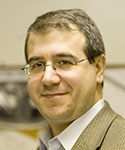
 |
eleftherios mylonakis Laboratory
ELEFTHERIOS MYLONAKIS, MD, PhD http://www.massgeneral.org/id/labs/mylonakis/ 55 Fruit Street Gray Jackson 5, Room GRJ-504 Boston, Massachusetts 02114 phone: (617) 726-3812 fax: (617) 726-7416 About Eleftherios Mylonakis Eleftherios Mylonakis is a physician-scientist. He was born in Larisa, Greece, and lived in Athens during most of his childhood. His parents encouraged his interest in science. "My parents gave me a 'blue collar' approach to science and to use common sense to approach complicated problems,” he says. Dr. Mylonakis moved to Boston after work at Brown University “The community at Brown University made the transition to New England so easy,” he says, adding: ‘‘The excitement of the New England area with sports, along with Seinfeld and Car Talk, also helped.” Dr. Mylonakis has published over 90 articles in the scientific literature. His work focuses on the study of fungal pathogenesis. His research on novel approaches to studying fungal pathogenesis and for the identification and study of new antifungal agents has been supported by peer-reviewed grants from the National Institutes of Health and private foundations. He serves on the editorial boards of many publications and as an ad hoc reviewer for over 30 journals.Research We study the outcome of the interaction between a pathogen and a host. Some virulence factors are induced only in the host and may therefore require specialized techniques to be identified, based on detection of these genes in vivo or the survival of mutagenized strains within specific host environments. We developed invertebrate systems for the study of fungal pathogenesis. The hypothesis is that a common, fundamental set of molecular mechanisms is employed by fungal pathogens against a widely divergent array of metazoan hosts. These surrogate hosts fill an important niche in microbial pathogenesis research and, along with established mammalian models provide us with a unique opportunity to identify and study basic, evolutionarily conserved aspects of microbial virulence and host response. We have developed a high-throughput whole-animal Caenorhabditis elegans assay to screen libraries of chemical compounds and identify those with antifungal activity. In vivo evaluation of libraries of chemical compounds could solve some of the main obstacles in current antifungal discovery, such as finding new classes of compounds and solving the bottleneck of toxicity/efficacy testing. Lab Personnel Ikechukwu Okoli, PhD Research Fellow Graciela Carrasco Undergraduate Beth Fuchs, PhD Research Fellow Elizabeth O'Brien Undergraduate student Emmanouil Tampakakis MD Anton Peleg, MD Research Fellow |
|||||||||||
| copyright © 2008 mgh | |||||||||||